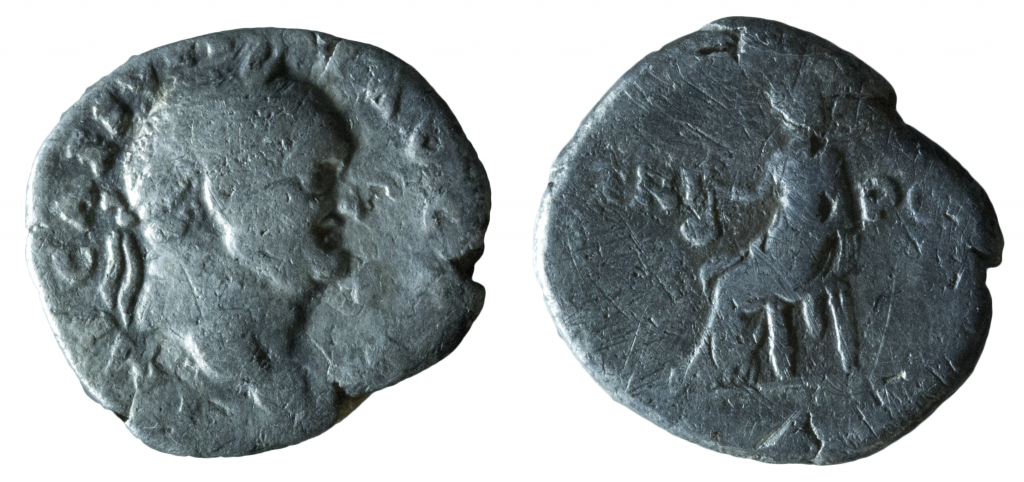June 23, 2015, by Will Leveritt
On this day in AD79 the emperor Vespasian died, aged 69.
Text by Mike Welbourn
Image © Mint Imperials
Vespasian had achieved the position of emperor by virtue of being the last man standing in the short civil war that erupted following Nero’s suicide in June of 68 (the so-called Year of the Four Emperors). The conflict came to an end in late December of 69, when Vespasian’s immediate predecessor, Vitellius, was murdered.

AR denarius of Vespasian. Obverse has laureate head of emperor right, IMP CAES VESP AVG PM. Reverse has Vesta seated left holding simpuluum, TRI POT. 18mm, 2.79g, 6 o’clock.
In terms of his rule, the impression given of Vespasian by our sources is of a competent and level-headed administrator who identified the various problems with which the Roman state was struggling and implemented effective solutions.
For example, a combination of Nero’s lavish expenditures and the effects of the civil war had left the empire’s finances in dire straits. Vespasian’s remedy was to increase existing taxes, revive old ones which had been abandoned by his predecessors, and impose new ones. Perhaps the most famous example from the latter category is his imposition of a tax on the use of public toilets.
When his son Titus rebuked him for raising revenue from such an unseemly source, Vespasian is said by Suetonius to have held a coin from the first intake of the tax to Titus’ nose and asked him if its smell revolted him. When Titus replied that it did not, his father quipped ‘and yet it comes from urine!’
Unfortunately for Vespasian, while his fiscal policies made economic sense, they led to a reputation as something of a money-grubber, and to accusations that he would employ somewhat underhanded tactics to raise money, such as allowing people to buy their way out of trouble in court or to purchase magisterial and other offices.
Vespasian also expedited the reconstruction of Rome – which seems still to have been suffering from the lingering effects of both the Great Fire of 64 and of general neglect – by allowing anyone with the money and the inclination to buy land and build on it, if the current owners were found to be unwilling.
In military and foreign affairs, Vespasian restored discipline in the army and standardized the structure of the empire by taking over the client kingdoms which still existed on the borders and converting them into full Roman provinces.
In addition to being a sensible ruler, Vespasian is also credited with being a humble and straightforward person. He was born on 17 November, AD 9 in the Sabine village of Falacrina, to a family of only local note, and it is said that his mother had to prod him into pursuing a senatorial career through sarcastic insults.
He struggled early in his career, including losing his first election to the aedileship, and later, when he governed Africa under Claudius, his honourable decision not to enrich himself at the expense of the province forced him to mortgage his property to his brother and fund himself by going into business as a muleteer, a decidedly lowly occupation for a man who would one day rule the Roman Empire.
Although his later career was somewhat more successful – consul in 51, and tasked under Nero with putting down the Jewish rebellion – his unremarkable career and background seems to have encouraged Vespasian not to take himself too seriously or let his ego get the better of him, even as emperor.
We are told that he was generally tolerant of criticism and jokes at his expense, choosing to respond in kind rather than attack the offender. Moreover, he avoided ordering the deaths of senators and giving in to rumours and fears of plots against him.
The exception to this rule was Helvidius Priscus, a high profile member of the so-called Stoic opposition, a group of nobles who followed the Stoic philosophy, held republican views and set their faces against the imperial system.
Priscus frequently insulted Vespasian and the dignity of the emperorship in word and deed; when his behaviour became intolerable he was exiled and later killed on Vespasian’s orders.
Vespasian ruled for almost ten years, when he fell ill and died. According to some sources his last words were ‘it is fitting that an emperor should die on his feet!’ pronounced after he felt sure his final moment had come and had struggled from his bed to die with dignity.
Alternatively, and in keeping with his tendency towards jocularity and self-deprecation, his final utterance was ‘oh dear, I think I’m becoming a god’, a wry reference to the ritual of deifying emperors after their deaths.
Vespasian had occupied the imperial throne for almost ten years, and at his death it passed to his eldest son Titus, thus establishing the Flavian dynasty. Indeed, Suetonius tells us that Vespasian declared to the senate that either his sons would succeed him or no one would.
No comments yet, fill out a comment to be the first

Leave a Reply